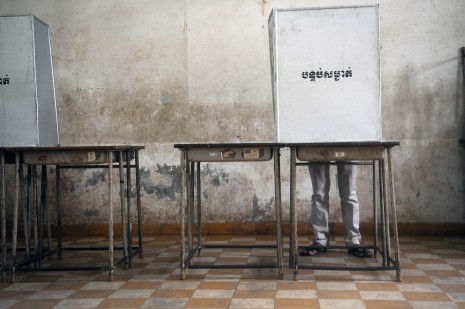[This story has been updated.]
Cambodians went to polling stations across the country Sunday to cast their vote in the fifth national election since 1993, when the U.N. organized the country’s first democratic ballot following decades of civil war.
Though the ruling Cambodian People’s Party (CPP) is widely expected to win, the merger of the country’s two opposition parties has raised expectations that Prime Minister Hun Sen’s ruling party could see a decline in its representation within the National Assembly for the first time in two decades.

The CPP holds 90 seats in the Assembly, while the Sam Rainsy Party and Human Rights Party, which have united as the Cambodia National Rescue Party (CNRP), hold 26 and three seats, respectively.
Since returning to the country on July 19, after being pardoned for what were widely believed to be politically motivated convictions that led to an 11-year prison sentence, CNRP president Sam Rainsy has been leading an opposition campaign that has seen tens of thousands of supporters turn out for rallies in urban and rural centers.
There are an estimated 9.6 million people eligible to vote in Sunday’s election.
Voter participation has also declined steadily since the 1998 national election when 93 percent of the electorate cast a ballot. During the last parliamentary election in 2008, just over 75 percent of eligible voters turned out at the polls.
On Saturday, the CNRP held a press conference to warn of the potential for widespread election fraud, claiming that hundreds of thousands of people are registered at more than one polling station.
Earlier Saturday morning, the Committee for Free and Fair Elections in Cambodia (Comfrel) announced that the supposedly indelible security ink used to ensure that voters only cast one ballot can be easily washed away.
The complaints were the latest in an already lengthy list of irregularities and failures to reform that have led Comfrel to predict that this year’s poll will be the least fair in Cambodia’s two-decade experiment with democracy.
The ruling CPP also maintained a firm grip on the country’s television stations during the electoral campaign with non-ruling parties only allowed 30 minutes a day on state-owned TVK to disseminate their message.
Mr. Rainsy’s return, which drew more than 100,000 people onto the streets of Phnom Penh, received no television coverage, while any TV news about the CNRP was focused on alleged criminality among the young supporters of the opposition. Along with wildly unequal access to the broadcast media, independent election monitors have raised concerns over the lack of impartiality of the National Election Committee (NEC), which is comprised mainly of members sympathetic to the ruling party.
Serious errors were also apparent in the official voter registration lists.
In an audit released in early April, Comfrel estimated that some 1.25 million voters could lose their right to vote Sunday because 13.5 percent of registered voters could not find their names on the voter list.
Prime Minister Hun Sen cast his ballot this morning in Takhmao City, a suburb of Phnom Penh in Kandal province, where the prime minister is the CPP’s top candidate and where his main residence is located.
CNRP vice president Kem Sokha, who led the opposition campaign prior to Mr. Rainsy’s return, voted in Kompong Cham province, where he tops the CNRP’s candidate list.
Mr. Rainsy, who, despite his Royal Pardon, was prevented from both standing as a candidate and also voting, spent Sunday morning visiting polling stations and markets around Phnom Penh in what he said was a personal fact-finding mission.
Mr. Rainsy said he was looking for “witnesses, indications, information, evidence.”
As for how opposition supporters will react to what Mr. Rainsy has already said will be an illegitimate election result, the opposition leader said that his party would await final results before deciding on their next move, which may include rejecting today’s results.
“We will see. I have to collect evidence first. It will depend on what will happen, on what kind of evidence we collect,” he said.




